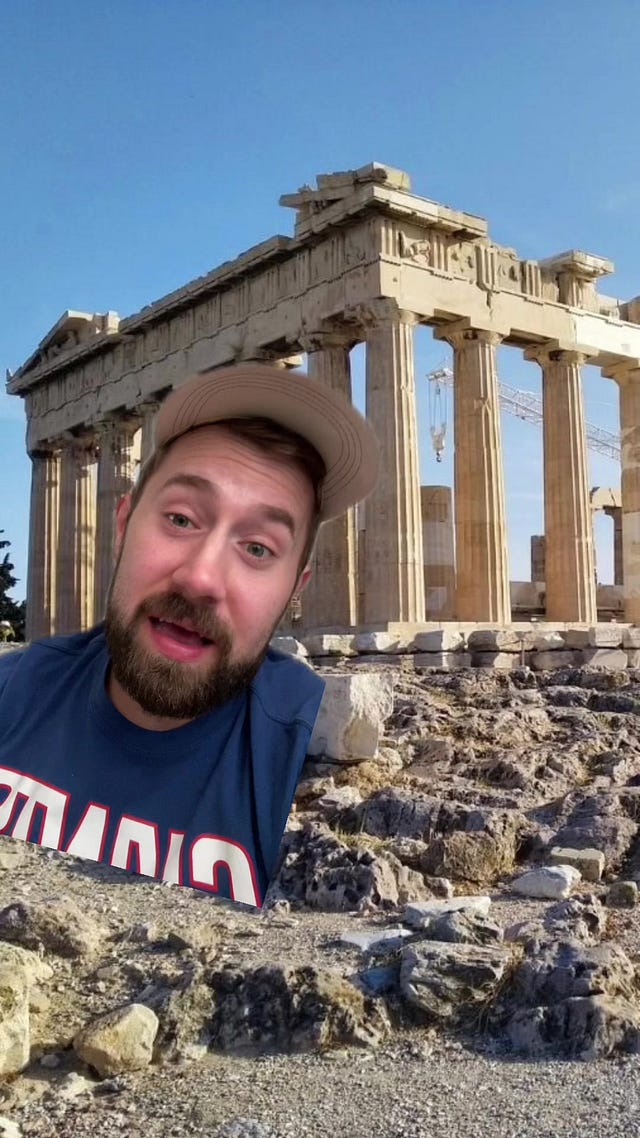You can't understand what you can't name | #7
Ancient Greeks can't see the color blue and you can't identify the song "Happy Birthday" from taps.
In this 7th issue of The Pole:
two Tik Toks:
ancient Greeks can't see blue
listeners can't guess Happy Birthday from taps alone
the curse of knowledge as evidence that naming things unlocks more capabilities for understanding things
the reason why games are difficult (Charades, Poetry for Neanderthals, and Code Names)
Two Tik Toks
I saw this Tik Tok the other day:
TL;DR:
Ancient Greek people couldn't see the color blue because they didn't have a name for it.
The Himba people can't distinguish between blue and green because they don't have a word for blue.
I looked into these findings, and unfortunately, they're both exaggerated.
But! I still believe naming things unlocks understanding. There's plenty of evidence for it.
In fact, I propose that curse of knowledge is even better evidence that naming things unlocks understanding.
The curse of knowledge is the idea that, once we understand a thing, we overestimate how obvious that thing is to others.
Have you ever had a math class where the teacher called something "simple" that was anything but? That's The Curse at work.
Want another example? Have another Tik Tok!
TL;DR:
Elizabeth Newton, a Stanford Psych PhD student did an experiment in the 90's where she had tappers tap out the rhythms of 120 songs for listeners.
Tappers expected listeners to guess the song 50% of the time, but listeners only guessed correctly 2.5% of the time.
A similar idea is a cognitive bias called the illusion of transparency.
Have you ever given a presentation and thought, wow, they could totally tell I was super nervous - but afterward, they said I couldn't tell you were nervous at all! or something similar?
That's the bias at work. It's a tendency to overestimate how well others understand your mental state.
The Curse of Knowledge as evidence
So how is the curse of knowledge evidence that naming things unlocks understanding?
To persuade you of that, I'll bring up (board) games. For example, Charades, Poetry for Neanderthals, and Code Names.
A core component of each game is trying to communicate a word to someone without saying the word.
If you've played any of those games, you know that communication without direct links to ideas i.e. names is hard. That's why those games are fun.
Why is it hard? Three reasons:
Using names for things is efficient. Saying a thing's name takes far less time than saying a thing's definition.
Delineating reality is hard. You have to give someone context that maps to a certain word and not to others. That requires a crippling amount of precision.
The curse of knowledge. We take for granted the luxury of shared context. When we don't have that luxury, we discover that we are out of practice at recreating context.
Have you ever had someone give you a ride to your house or apartment that has never been there before?
Did you find yourself forgetting to tell them to turn left or right?
Yeahhh. We're all victims of The Curse.
But this curse points out that we’re used to the blessing of shared context.
When we have context, we don't have to spend cognitive energy creating or retrieving it.
When we name things, we give ourselves a lens to see new patterns and have new ideas.
Have you ever noticed that you buy a new car, you start seeing that car more often on the roads?
Do you remember your first job? Remember how, at first, every other word was incomprehensible jargon?
Do you remember first Math class? Remember how reading the equation was like reading sterile gibberish?
But then, after you internalized what everything meant, reading it painted a picture in your mind?
The point is that naming things has a priming effect for new thoughts. Every time we name something, we get a little bit of X-Ray vision.
That's why Math professors struggle to explain things.
It's not enough to define a word or symbol.
It's sometimes enough to give examples or metaphors, when we can rely on shared context.
It's best when we can cycle between naming patterns and spotting them in the wild i.e. gathering that context.
We struggle to communicate things without context because we forget how much context there actually is.
Even when we understand how specific we have to be, we forget that naming things isn't enough.
Often, it's just the beginning.






